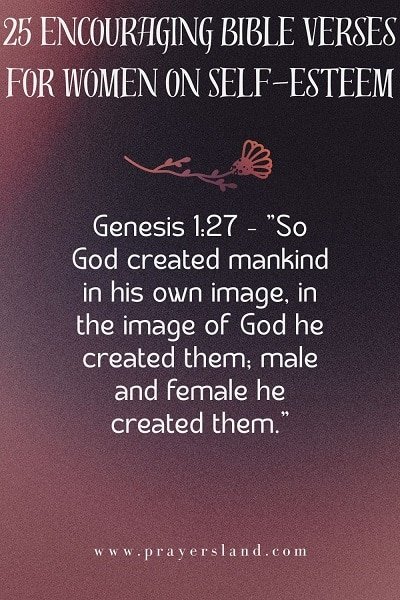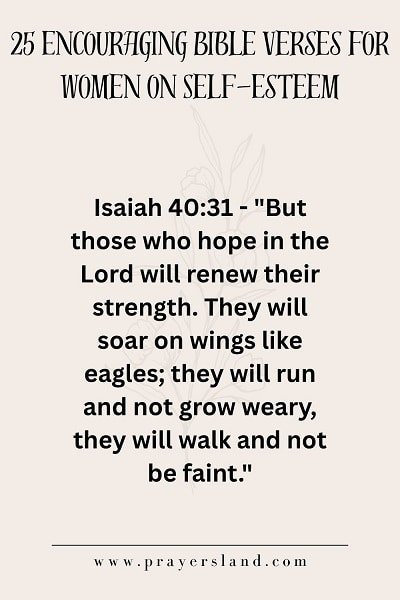Bible Verses for Women on Self-Esteem can speak straight to your heart especially when doubt, comparison, or insecurity starts to creep in. If you’ve ever questioned your worth or struggled to see yourself the way God does, you’re not alone and you’re in the right place.
God’s Word is full of truth about who you are: loved, chosen, and beautifully made. These verses will remind you of your value, renew your confidence, and help you see yourself through His eyes. Ready to trade self-doubt for God-given confidence? Let’s dive into the encouragement your soul’s been waiting for.

Your Divine Design: Understanding God’s Creation
The foundation of healthy self-esteem begins with understanding how God created you. These verses reveal the intentionality and love behind your existence, showing that you’re not an accident but a carefully crafted work of art.
Genesis 1:27 – “So God created mankind in his own image, in the image of God he created them; male and female he created them.”
You bear God’s image, which means you reflect His character, creativity, and love. This isn’t about physical appearance—it’s about your capacity for relationship, creativity, moral reasoning, and spiritual connection. When you struggle with self-worth, remember that you carry the divine DNA of the Creator Himself.
Practical Application: When negative self-talk begins, remind yourself: “I am made in God’s image. I reflect His nature and character.”
Psalms 139:13-14 – “For you created my inmost being; you knit me together in my mother’s womb. I praise you because I am fearfully and wonderfully made; your works are wonderful, I know that full well.”
King David understood that God’s involvement in our creation wasn’t distant or casual. The phrase “fearfully and wonderfully made” suggests awe-inspiring complexity and intentional design. God didn’t mass-produce humans; He carefully crafted each person with unique gifts, personalities, and purposes.
Practical Application: Create a gratitude journal listing unique qualities God has given you, celebrating the intricate ways He designed you.
Genesis 2:18 – “The Lord God said, ‘It is not good for the man to be alone. I will make a helper suitable for him.'”
This verse reveals that women were created to fill a void in creation not as an afterthought, but as the completion of God’s perfect design. The Hebrew word “ezer” (helper) is the same word used to describe God as our helper, indicating strength, support, and essential partnership.
Practical Application: Recognize that your presence, perspective, and contributions are not just welcomed but necessary in your relationships, workplace, and community.
Isaiah 64:8 – “Yet you, Lord, are our Father. We are the clay, you are the potter; we are all the work of your hand.”
This beautiful metaphor shows God as the master craftsman who shapes us with purpose and care. Just as a potter doesn’t create vessels randomly, God’s purpose for your life is intentional and meaningful. You’re not a factory reject; you’re a custom creation.
Practical Application: When facing challenges, ask God to continue His work in you, trusting that He’s shaping you for His purposes.
Ephesians 2:10 – “For we are God’s handiwork, created in Christ Jesus to do good works, which God prepared in advance for us to do.”
The Greek word for “handiwork” is “poiema,” from which we get our word “poem.” You are God’s masterpiece His work of art, His poem written in flesh and blood. Your life has rhythm, beauty, and meaning that contributes to His greater story.
Practical Application: Look for opportunities to live out the good works God has prepared for you, knowing that your contributions matter to His kingdom.
Your Unshakeable Worth: God’s Love and Value

Understanding how much God values you transforms how you see yourself. These verses reveal that your worth isn’t based on performance, appearance, or others’ opinions it’s rooted in God’s unchanging love.
Luke 12:6-7 – “Are not five sparrows sold for two pennies? Yet not one of them is forgotten by God. Indeed, the very hairs of your head are all numbered. Don’t be afraid; you are worth more than many sparrows.”
Jesus Christ used this everyday illustration to show God’s attention to detail in caring for His creation. If God notices when a sparrow falls, how much more does He care about every aspect of your life? The phrase “you are worth more than many sparrows” establishes your immense value in God’s economy.
Practical Application: In moments of feeling overlooked or undervalued, remember that God knows intimate details about you and considers you precious.
1 Peter 2:9 – “But you are a chosen people, a royal priesthood, a holy nation, God’s special possession, that you may declare the praises of him who called you out of darkness into his wonderful light.”
This verse reveals multiple aspects of your identity through Christ: chosen, royal, holy, and special. You belong to royal priesthood, which means you have direct access to God and the privilege of interceding for others. Your Christian faith gives you nobility that no earthly title can match.
Practical Application: Carry yourself with the dignity of royalty, knowing that you represent the King of Kings in your daily interactions.
Isaiah 41:10 – “So do not fear, for I am with you; do not be dismayed, for I am your God. I will strengthen you and help you; I will uphold you with my righteous right hand.”
This powerful promise addresses the fear that often underlies low self-esteem. God doesn’t just offer comfort; He provides strength, help, and support. The phrase “Do not be afraid, for I am with you” reminds us that confidence through faith comes from God’s presence, not our own abilities.
Practical Application: When facing challenges that make you feel inadequate, declare this verse aloud and step forward in faith over fear.
Jeremiah 29:11 – “For I know the plans I have for you,” declares the Lord, “plans to prosper you and not to harm you, to give you hope and a future.”
This beloved verse reveals that God’s love includes intentional planning for your future. Your life isn’t random or purposeless God has specific plans designed to prosper you. This doesn’t guarantee an easy life, but it promises a meaningful one.
Practical Application: When uncertain about your future, meditate on God’s good plans for you and trust His timing and wisdom.
Romans 12:3 – “For by the grace given me I say to every one of you: Do not think of yourself more highly than you ought, but rather think of yourself with sober judgment, in accordance with the faith God has distributed to each of you.”
Paul provides balance here healthy self-esteem isn’t about thinking too highly or too lowly of yourself, but about seeing yourself accurately through God’s eyes. This verse encourages realistic self-assessment based on the gifts and faith God has given you.
Practical Application: Regularly inventory your God-given gifts and use them confidently while maintaining humility about their source.
Your Inner Beauty: Character Over Appearance

The Bible consistently emphasizes that true beauty comes from within. These verses help women understand that while physical appearance may fade, inner beauty rooted in character creates lasting impact and true attractiveness.
1 Peter 3:3-4 – “Your beauty should not come from outward adornment, such as elaborate hairstyles and the wearing of gold jewelry or fine clothes. Rather, it should be that of your inner self, the unfading beauty of a gentle and quiet spirit, which is of great worth in God’s sight.”
This passage doesn’t condemn caring for your appearance, but it prioritizes inner beauty over external decoration. A “gentle and quiet spirit” doesn’t mean being passive or voiceless it refers to a peaceful confidence that doesn’t need to prove itself through external means.
Practical Application: Invest as much time developing your character as you do your appearance, knowing that inner beauty grows more attractive with time.
Proverbs 31:30 – “Charm is deceptive, and beauty is fleeting, but a woman who fears the Lord is to be praised.”
This verse from the famous Proverbs 31 passage contrasts temporary physical beauty with the lasting value of reverence for God. The fear of the Lord refers to deep respect and awe for God that influences all life decisions.
Practical Application: Build your reputation on godly character rather than appearance, knowing that spiritual beauty never fades.
Song of Solomon 4:7 – “You are altogether beautiful, my darling; there is no flaw in you.”
While this verse appears in the context of romantic love, it reflects how God sees His daughters. In Christ’s strength, you are made beautiful and flawless in God’s eyes. This isn’t about physical perfection but about the spiritual transformation that occurs through faith.
Practical Application: When you notice your flaws, remember that God sees you as altogether beautiful through Christ’s righteousness.
Proverbs 31:25 – “She is clothed with strength and dignity; she can laugh at the days to come.”
This powerful description of biblical femininity shows a woman who wears strength and dignity like beautiful clothing. The phrase “clothed with strength and dignity” suggests that these qualities become her identity and reputation.
Practical Application: Choose to “wear” strength and dignity in your daily interactions, facing the future with confidence in God’s provision.
Your Divine Strength: Power Through Faith

Many women struggle with feeling weak or incapable. These verses reveal that true strength comes not from our own abilities but from our connection to God’s unlimited power.
Philippians 4:13 – “I can do all this through him who gives me strength.”
This famous verse is often misunderstood as a guarantee of success in any endeavor. In context, Paul was referring to contentment in various circumstances. The verse promises that through Christ’s strength, you can handle whatever life brings abundance or need, success or failure.
Practical Application: Before tackling challenging situations, pray for God’s strength rather than relying solely on your own abilities.
2 Corinthians 12:9 – “But he said to me, ‘My grace is sufficient for you, for my power is made perfect in weakness.’ Therefore I will boast all the more gladly about my weaknesses, so that Christ’s power may rest on me.”
This verse transforms our understanding of weakness. Instead of hiding our limitations, we can acknowledge them as opportunities for God’s power to be displayed. Your weaknesses don’t disqualify you; they create space for God’s strength to shine.
Practical Application: Instead of feeling ashamed of your limitations, see them as opportunities to rely on and display God’s power.
Isaiah 40:31 – “But those who hope in the Lord will renew their strength. They will soar on wings like eagles; they will run and not grow weary, they will walk and not be faint.”
This verse promises supernatural strength for those who hope in God. The progression from soaring to running to walking shows that God’s strength sustains us through both extraordinary and ordinary moments of life.
Practical Application: When feeling exhausted or overwhelmed, spend time in prayer and Scripture, asking God to renew your strength.
Joshua 1:9 – “Have I not commanded you? Be strong and courageous. Do not be afraid; do not be discouraged, for the Lord your God will be with you wherever you go.”
God’s command to “be strong and courageous” isn’t based on our natural abilities but on His presence. Confidence through Christ means we can face challenges because God goes with us.
Practical Application: Before entering intimidating situations, remind yourself that God has commanded you to be strong and courageous because He’s with you.
Your Spiritual Transformation: Growing in Christ
Spiritual growth is a journey of becoming more like Christ. These verses encourage women to embrace the process of transformation and find their identity in their relationship with God.
Romans 12:2 – “Do not conform to the pattern of this world, but be transformed by the renewing of your mind. Then you will be able to test and approve what God’s will is his good, pleasing and perfect will.”
This verse calls for inner transformation through renewing the mind with Scripture. Rather than conforming to worldly standards of success, beauty, or worth, we’re called to be transformed by God’s truth.
Practical Application: Regularly study Scripture to renew your mind, replacing worldly thoughts with God’s perspective on your identity and purpose.
Ephesians 3:12 – “In him and through faith in him we may approach God with freedom and confidence.”
This verse reveals that faith gives us confidence to approach God directly. You don’t need to feel perfect or worthy to come to God—your identity in Christ gives you access to the throne of grace.
Practical Application: Pray with confidence, knowing that Christ has given you the right to approach God as His beloved daughter.
Philippians 1:6 – “Being confident of this, that he who began a good work in you will carry it on to completion until the day of Christ Jesus.”
This verse provides assurance that God’s work in your life isn’t finished. You’re a work in progress, and God is committed to completing what He started. This truth helps combat perfectionism and self-condemnation.
Practical Application: When frustrated with your spiritual growth, remember that God isn’t finished with you yet and trust His process.
Hebrews 10:35-36 – “So do not throw away your confidence; it will be richly rewarded. You need to persevere so that when you have done the will of God, you will receive what he has promised.”
This passage encourages us to maintain confidence through faith even when circumstances are difficult. Perseverance in following God’s will leads to receiving His promises.
Practical Application: When tempted to give up on God’s promises, hold fast to your confidence in His faithfulness.
Your Secure Future: Trusting God’s Plan
Fear about the future often undermines self-esteem. These verses help women trust God’s guidance and provision for their lives.
Proverbs 3:5-6 – “Trust in the Lord with all your heart and lean not on your own understanding; in all your ways submit to him, and he will make your paths straight.”
This beloved passage calls for complete trust in God rather than relying on our own wisdom. The promise that “He will make straight your paths” assures us that God will guide our steps when we submit to Him.
Practical Application: When facing major decisions, seek God’s wisdom through prayer and Scripture rather than relying solely on your own understanding.
Proverbs 18:10 – “The name of the Lord is a fortified tower; the righteous run to it and are safe.”
This verse presents God as a place of safety and protection. When life feels overwhelming, we can run to Him for security and peace.
Practical Application: In times of trouble or anxiety, “run” to God through prayer, finding safety in His presence and character.
Psalm 143:8 – “Let the morning bring me word of your unfailing love, for I have put my trust in you. Show me the way I should go, for to you I entrust my life.”
This psalm shows the pattern of starting each day by remembering God’s unfailing love and asking for His guidance. Trusting God’s plan begins with daily surrender and dependence on Him.
Practical Application: Begin each day by remembering God’s love for you and asking for His guidance in the decisions you’ll face.
Conclusion: Embracing Your True Identity
These 25 verses reveal a beautiful truth: your self-esteem doesn’t need to depend on the shifting sands of worldly success, appearance, or others’ opinions. Instead, it can rest on the solid foundation of who you are in Christ. God’s love for you is not based on your performance but on His character. His plans for you are good, His strength is available to you, and His identity for you is secure.
The journey to healthy self-esteem through Scripture isn’t about perfection it’s about perspective. When you see yourself through God’s eyes, you discover that you are His masterpiece, created with intention, loved unconditionally, and equipped for His purposes. Your worth isn’t something you earn; it’s something you receive through faith in Christ.
Biblical encouragement transforms how we view ourselves because it anchors our identity in unchanging truth rather than changing circumstances. As you meditate on these verses, allow them to renew your mind and reshape your understanding of who you are.
Remember that God’s design for your life includes both strength and gentleness, confidence and humility, independence and interdependence. You are called to be a purpose-driven woman who reflects God’s character in your unique sphere of influence.
Bonus Section: Practical Ways to Use These Verses
For Daily Affirmation: (Bible Verses For Women on Self-Esteem)
- Choose one verse each week to memorize and meditate on
- Write your favorite verses on index cards and place them where you’ll see them daily
- Create a Scripture for self-esteem journal where you write out verses and your reflections
For Challenging Moments:
- Keep a list of these verses on your phone for quick access during difficult times
- Share these verses with friends who might be struggling with self-worth issues
- Use these verses as prayer starters when you’re feeling inadequate or discouraged
For Spiritual Growth:
- Study the context of each verse to deepen your understanding
- Research the original Hebrew or Greek words to gain deeper insights
- Join or start a Bible study focused on identity in Christ and biblical femininity
For Encouraging Others:
- Share these verses with daughters, sisters, or friends who need encouragement
- Use these verses in Christian encouragement cards or messages
- Incorporate these truths into mentoring relationships with younger women
Frequently Asked Questions
Q: How can I truly believe these verses when I struggle with deep-seated self-esteem issues? A: Healing from low self-esteem through Scripture is a process, not an instant fix. Start by reading these verses regularly, even if you don’t feel them immediately. Faith often begins with choosing to believe God’s truth over our feelings. Consider seeking counseling from a Christian mental health professional who can help you work through deeper issues while grounding you in biblical truth.
Q: Are these verses just for women, or can men benefit from them too? A: While this article focuses on women’s self-worth and biblical femininity, the foundational truths about identity in Christ apply to all believers. Men can certainly benefit from understanding their worth in God’s eyes, though they might apply these truths differently based on their unique roles and calling.
Q: How do I balance humility with healthy self-esteem? A: Biblical encouragement teaches that healthy self-esteem is actually rooted in humility—recognizing that your worth comes from God, not from your own achievements. True humility isn’t thinking less of yourself; it’s thinking of yourself less. When you understand your value as God’s masterpiece, you can be confident without being prideful.
Q: What if I’ve made mistakes that make me feel unworthy of God’s love? A: God’s unconditional love isn’t based on your performance or past mistakes. These verses about forgiveness and grace apply to everyone, regardless of their history. Christ’s strength covers your weaknesses, and His righteousness replaces your failures. Your identity is not defined by your worst moments but by God’s love for you.
Q: How can I help my daughter develop healthy self-esteem based on these biblical principles? A: Start by modeling confidence through faith in your own life. Regularly affirm your daughter’s God-given qualities and help her memorize key verses about her identity in Christ. Focus conversations on character development rather than appearance, and teach her to find her worth in being God’s daughter rather than in worldly achievements.
Q: Can these verses help with anxiety and depression? A: While these verses can provide significant emotional support through Scripture, they work best as part of a comprehensive approach to mental health. Scripture can be incredibly healing, but don’t hesitate to seek professional help if you’re struggling with clinical anxiety or depression. Christian mental health professionals can help you integrate biblical truth with practical coping strategies.
Q: How often should I read these verses to see real change in my self-esteem? A: Renewing your mind with Scripture is an ongoing process. Many people find daily reading helpful, but consistency matters more than frequency. Whether you read them daily, weekly, or whenever you’re struggling, the key is regularly returning to these truths and allowing them to shape your thinking over time.
Q: What’s the difference between worldly self-esteem and biblical self-worth? A: Worldly self-esteem often depends on external factors like appearance, achievements, or others’ opinions. Biblical self-worth is rooted in your identity as God’s creation and your relationship with Him. While worldly self-esteem can fluctuate with circumstances, biblical self-worth remains stable because it’s based on God’s unchanging character and love.
For more visit: https://prayersland.com/

Noah James is the author behind PrayersLand, a blog dedicated to inspiring faith, hope, and spiritual growth. With a deep passion for prayer and devotion, he shares heartfelt reflections, powerful prayers, and uplifting insights to strengthen believers on their spiritual journey. His writings aim to bring comfort, wisdom, and divine connection.

